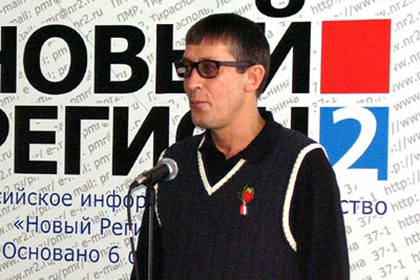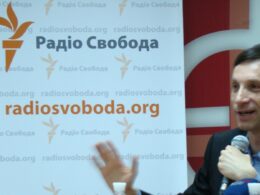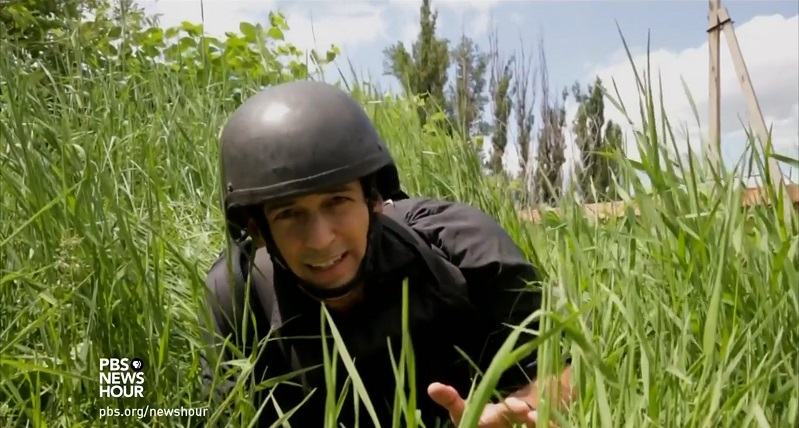One year ago, the Russian opposition journalist Alexander Shchetinin was found dead with a gunshot wound in Kyiv.

Alexander, or as his friends called him, Sasha, fled from Russia to Ukraine after the Euromaidan Revolution, complaining of unacceptable pressure by the Russian government on the editors the Novyi Region news agency he founded. His agency in Russia was targeted by authorities for supporting “terrorist” activities, that is, publishing articles condemning Russia’s war in Ukraine. In Kyiv, he re-launched the company, naming it Novy Region 2 and locating it on the Ukrainian ".ua” Internet domain. The new site featured the same fiercely critical anti-war publications, including a particular focus on detailing techniques of Russia’s propaganda operation aimed at Russian and Ukrainian audiences.
"For many years in a row, I have been a staunch opponent of the current fascist dictatorship in Russia. Putin is my personal enemy. I always believed that we will be able to overcome the dictatorship, and Russia will be free," - from the interview of Alexander Shchetinin to RFERL in 2014.
An email which was sent from his account to the chief editor of Novyi Region 2 in Kyiv, Olga Meshcheryakova, shortly before his death named financial difficulties and distress he lived through from the separation with his family as reasons for suicide. Novyi Region 2 was financed from his personal savings; Shchetinin declined offers from Ukrainian oligarchs to finance the venture, not wanting to sacrifice its editorial independence, Meshcheryakova said. However, other friends of Shchetinin doubt that he took his own life, saying he was too strong of a character, and that it's impossible to verify that the email was written by Shchetinin. The investigation continues being investigated as a murder. The main lines of inquiry are suicide and connections with his professional activities.
Russian journalist Kseniya Kirillova, Shchetinin's colleague, who had, similarly to Shchetinin faced retribution from the Russian authorities and emigrated to the USA, has written an obituary to her friend where she writes about the Ukraine that Sasha fell in love with, his courage to act differently and not partake in the crimes of his state like millions of Russians, and about his faithfulness to his ideals to the end. Below is a complete translation Kseniya Kirillova's article.

Sasha Shchetinin – a contradictory, a little strange, and at the same time an amazing man - has left us a little over a year ago.
I wrote a lot about Sasha: an obituary, then an article and even poetry. But that's still not enough to describe the kind of person he was. I listed the facts of the last years of his life, quoted his letters, but, it seems to me, still couldn't find the right words to say about him. Today, I will try to write about Sasha from a different perspective – about what impression he made on me and what trace he left in my life and in our work. Maybe it will be more subjective than all my previous materials about Alexander (Sasha) Schetinin. And, at the same time, more personal.
This is the key to how Sasha managed to combine cynicism and romanticism, a business savvy, a rich life experience and at the same time – an amazing childishness, a boyish carefree impetuousness, illogical and impractical at times bluntness, dogmatism, headstrong personality, humor, strength, vulnerability and all the rest. He, a rather cynical and not at all naive person, who knew firsthand the world's cruelty and who learned to live with it, suddenly allowed himself to do the right thing, and as a result to fall in love – from the heart, uncompromisingly, unselfishly. He fell in love with what is considered an abstraction, not even a living person, and formally just a territory delineated by the state boundaries. But he loved her more faithfully and devotedly than a living person. Sasha, like a schoolboy, fell in love with Ukraine.
He sacrificed everything for this love and he lost a lot. He was not a romantic youth who did not know life. He was an established adult who founded a large, successful business, who participated in many deals, not all of them reputable, who had connections with the Kremlin. He was not an angel, far from an angel. He could not be accused of naiveté or stupidity.

There are some actions that cleanse the soul in a contradictory way. It's a bit like a soldier returning from the front – it seems he became coarser, worldlier, he has seen much, his heart is heavy. And at the same time, he sometimes behaves like a child – rambunctious, wild, he seems to have lost all the ability to adjust to life. He sometimes becomes naive and vulnerable to the limit. And the reason for this, I think, is not only in the stressful events that he had lived through.
During the war, actions and sacrifices are measured on a different scale, which, on the one hand, wounds the soul, and on the other – purifies it. Any heroic action is always a psychological trauma, it’s always sacrifice and pain. But at the same time, this action reveals a different measure of life, renews and cleanses the very essence of it. And it all blends together: a new level of morality, a sense of amazing freedom, a phenomenal strength that gives a sense of righteousness, the deepest trauma, the weight of the experience that tears the soul to bloody splinters - this bizarre mixture is the price to pay for such actions.
That's why Sasha could be a dry professional, a mocking cynic, and at the same time run around like a boy in front of the sinister Lubyanka building and be photographed against the backdrop of the chekist nest with the "Ukrainian" teddy bear Stepa. He did not care what people thought about him and how it might look. He did not hesitate to bring this bear with him even to the most serious meetings. Sasha was free to the end since he felt that by his act and sacrifice he deserved the sacred right to be himself in everything. He knew that he did the right thing, and it gave him an amazing power, against which nothing else mattered. He, who had lost almost everything in life, did not think about "status" or "respectability." Today, this bear Stepa has become a symbol of struggle and fearlessness, of how a small weak creature can become very strong if it believes in what it does.
At times, it seemed that Sasha's heroic act had saturated him to the core. Its consequences were manifested in everything: both in bad and good. Of course, victimization and psychological trauma do not improve one's character. Stress means exposed nerves and an overburdened heart. And that's why Sasha was very abrasive, sometimes unjustifiably abrasive. Those who knew him before said that he always had a difficult character, and the war completely destroyed his ability to be diplomatic. Sasha quarreled with Russian refugees in Ukraine because they, in his opinion, did not sufficiently love the country that gave them shelter. He picked arguments needlessly and behaved at times like he was one exposed nerve. Some complained about his personality, some found it difficult to be with him. I've always found it easy to be with him, even with all his "glitches." I just understood why he is like that. Everything that concerned the country that he loved was more important to him than his own well-being.

Yes, it is important to understand that Sasha had his personal problems and shortcomings not related to his actions on Ukraine. He was not perfect, and his past was even less ideal. But he knew how to love, and this eclipsed everything else. He loved the country that he had chosen, and his fearlessness was due to this love. His bravery and audacity were dictated by this love, and even his shortcomings were associated with it. And he did a lot for the country he had fallen in love with.
The story of Sasha Shchetinin does not mean that everyone who commits such an act will necessarily perish. In war, it is impossible to predict the outcome, and much less worthy people died at the hands of Russian murderers only because they knew too much and became inconvenient witnesses or accomplices to crimes. At the same time, there are examples of brave and worthy people who did survive.
I know that Sasha's deed brought him happiness, and he never regretted it. When shortly before his death some cronies from Yanukovych's circle wanted to buy his site, he turned them down, although at that moment he needed the money. But he remained faithful to the end. This is something everyone can emulate in order to continue the work that he had dedicated his life to.
How this story will end – in death or in victory, no longer depends on him, but rather on all of us. And I want to believe that it will have a different ending around the next turn.
Read also:
- Another death of a Russian opposition journalist: Alexander Shchetinin remembered by Kirillova
- How journalism died in Russia. A Russian journalist describes
- What the murdered Ukrainian-Belarusian journalist Sheremet stood for
- The murders of two journalists are surprisingly similar — Portnikov
- Journalist’s murder designed to destabilize Ukraine — officials





